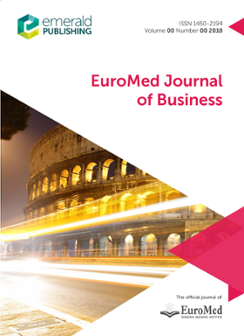Machine and deep learning-based stock price prediction during the COVID-19 pandemic: the case of CAC 40 index
IF 3.9
Q2 BUSINESS
引用次数: 2
Abstract
PurposeThe goal of this study is to investigate the predictive performance of the machine and deep learning methods in predicting the CAC 40 index and its 40 constituent prices of the French stock market during the COVID-19 pandemic. The study objective in forecasting the CAC 40 index is to analyze if the index and the individual prices will preserve the continuous increase they acquired at the beginning of the administration of vaccination and containment measures or if the negative effect of the pandemic will be reflected in the future.Design/methodology/approachThe authors apply two machine and deep learning methods (KNN and LSTM) and compare their performances to ARIMA time series model. Two scenarios have been considered: optimistic (high values) and pessimistic (low values) and four periods are examined: the period before COVID-19 pandemic, the period during the COVID-19, and the period of vaccination and containment. The last period is divided into two sub-periods: the test period and the prediction period.FindingsThe authors found that the KNN method performed better than LSTM and ARIMA in forecasting the CAC 40 index for both scenarios. The authors also identified that the positive effect of vaccination and containment outweighs the negative effect of the pandemic, and the recovery pattern is not even among major companies in the stock market.Practical implicationsThe study empirical results have valuable practical implications for companies in the stock market to respond to unexpected events such as COVID-19, improve operational efficiency and enhance long-term competitiveness. Companies in the transportation sector should consider additional investment in R&D on communication and information technology, accelerate their digital capabilities, at least in some parts of their businesses, develop plans for lights out factories and supply chains to keep pace with changing times, and even include big data resources. Additionally, they should also use a mix of financing sources and securities in order to diversify their capital structure, and not rely only on equity financing as their share prices are volatile and below the pre-pandemic level. Considering portfolio allocation, the transportation sector was severely affected by the pandemic. This displays that transportation equities fail to be a candidate as a good diversifier during the health crisis. However, the diversification would be worth it while including assets related to the banking and industrial sectors. On another strand, the instability of this period induced an informational asymmetry among investors. This pessimistic mood affected the assets' value and created a state of disequilibrium opening up more opportunities to benefit from potential arbitrage profits.Originality/valueThe impact of COVID-19 on stock markets is significant and affects investor behavior, who suffered amplified losses in a very short period of time. In this regard, correct and well-informed decision-making by investors and other market participants requires careful analysis and accurate prediction of the stock markets during the pandemic. However, few studies have been conducted in this area, and those studies have either concentrated on some specific stock markets or did not apply the powerful machine learning and deep learning techniques such as LSTM and KNN. To the best of our knowledge, no research has been conducted that used these techniques to assess and forecast the CAC 40 French stock market during the pandemic. This study tries to close this gap in the literature.基于机器和深度学习的COVID-19大流行期间股价预测:以CAC 40指数为例
本研究的目的是研究机器和深度学习方法在COVID-19大流行期间预测法国股市CAC 40指数及其40个成分股价格的预测性能。预测CAC 40指数的研究目的是分析该指数和个别价格是否会保持在接种疫苗和控制措施开始时获得的持续增长,或者大流行的负面影响是否会在未来得到反映。设计/方法/方法作者应用了两种机器和深度学习方法(KNN和LSTM),并将其性能与ARIMA时间序列模型进行了比较。考虑了两种情况:乐观(高值)和悲观(低值),并审查了四个时期:COVID-19大流行前时期、COVID-19期间和疫苗接种和遏制时期。最后一个阶段分为两个子阶段:测试阶段和预测阶段。作者发现,在预测两种情况下的CAC - 40指数方面,KNN方法比LSTM和ARIMA方法表现更好。这组作者还指出,疫苗接种和遏制的积极影响超过了大流行的负面影响,甚至在股市的主要公司中也没有出现复苏模式。研究的实证结果对股票市场公司应对新冠肺炎等突发事件,提高运营效率,增强长期竞争力具有重要的现实意义。交通运输行业的公司应该考虑在通信和信息技术的研发方面进行额外投资,至少在某些业务领域加快数字化能力的发展,制定关紧工厂和供应链的计划,以跟上时代的变化,甚至包括大数据资源。此外,它们还应混合使用融资来源和证券,以使其资本结构多样化,而不是仅仅依赖股权融资,因为它们的股价波动较大,低于大流行前的水平。考虑到投资组合分配,运输部门受到大流行病的严重影响。这表明,在医疗危机期间,运输类股票无法成为一个良好的多元化投资对象。然而,如果包括与银行和工业部门相关的资产,这种多元化将是值得的。另一方面,这一时期的不稳定导致投资者之间的信息不对称。这种悲观情绪影响了资产的价值,并造成了一种不均衡状态,为从潜在套利利润中获利提供了更多机会。新冠肺炎疫情对股市的影响是巨大的,影响到投资者的行为,投资者在很短的时间内遭受了更大的损失。在这方面,投资者和其他市场参与者的正确和明智的决策需要在大流行期间仔细分析和准确预测股票市场。然而,在这一领域进行的研究很少,这些研究要么集中在一些特定的股票市场,要么没有应用强大的机器学习和深度学习技术,如LSTM和KNN。据我们所知,在疫情期间,还没有进行过使用这些技术评估和预测CAC 40法国股票市场的研究。本研究试图弥补这一文献空白。
本文章由计算机程序翻译,如有差异,请以英文原文为准。
求助全文
约1分钟内获得全文
求助全文
来源期刊

EuroMed Journal of Business
BUSINESS-
CiteScore
9.80
自引率
19.20%
发文量
61
期刊介绍:
The EuroMed Journal of Business (EMJB) is the premier publication facilitating dialogue among researchers from Europe and the Mediterranean. It plays a vital role in generating and disseminating knowledge about various business environments and trends in this region. By offering an up-to-date overview of emerging business practices in specific countries, EMJB serves as a valuable resource for its readers.
As the official journal of the EuroMed Academy of Business, EMJB is committed to reflecting the economic growth seen in the European-Mediterranean region. It aims to be a focused and targeted business journal, highlighting environmental opportunities, threats, and marketplace developments in the area. Through its efforts, EMJB promotes collaboration and open dialogue among diverse research cultures and practices.
EMJB serves as a platform for debating and disseminating research findings, new research areas and techniques, conceptual developments, and practical applications across various business segments. It seeks to provide a forum for discussing new ideas in business, including theory, practice, and the issues that arise within the field.
 求助内容:
求助内容: 应助结果提醒方式:
应助结果提醒方式:


